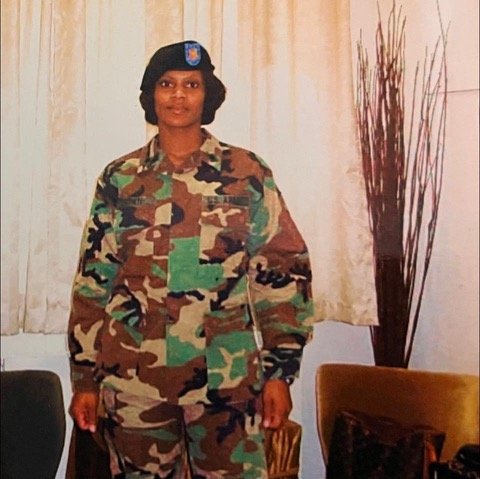A Story for Women in the Military
By Leah Kincaid, GSU Student Reporter
Chemeka Harris in Army Uniform in 2004
At just 24 years old, Chemeka Harris made a decision in 2003 in hopes of making a better life for herself and her two children. But little did she know that this decision came with its own challenges as a black woman in the military.
As a mother working three jobs, seven days a week, and taking college night classes, Harris felt stuck.
“No matter how hard I worked it just seemed like I was spinning my wheels, and I wasn’t able to get in a good place financially… it just seemed like I wasn’t moving fast enough,” she said.
Harris met her recruiter through her sister, Jessica, who was looking into joining the U. S. Army.
“One of the things that was most striking to me was the health benefits and the educational opportunities,” Harris said. “I realized it was a good opportunity for me to get ahead.”
With the support of her family, she took a chance but quickly started noticing the “individualized limitations and expectations,” of women serving in the military.
Harris recalls a time of what she called “pure sexism” when she was going through a company run for her physical training, carrying all her gear, which weighed up to 75 pounds.
“We were running…and the first sergeant told the male soldiers to grab the females gear so we could make it up the hill,” she said. “It just kind of did something to me and made me feel that he thought us, as the female soldiers, weren’t capable of carrying our load.”
Harris goes onto say that it felt “symbolic” to her and she wanted to prove a point.
“When someone reached for my gear I said, ‘no I got it,’ and that made me run even harder and faster. I even beat some of my male counter parts to the top of the hill.”
Harris realized, there were still hints of sexism as well as a notion that female soldiers were seen as less than because they weren’t physically capable of fulfilling the same duties as male soldiers. She said she felt as if she was not given the opportunity to prove that she could do every task required of her as a soldier.
“I often took a chance in speaking out against that, which was not always smiled upon.” She said.
Harris felt that by “setting the example,” she did not let those stereotypical excuses placed on female soldiers stop her from doing what she had to. But while Harris had negative experiences like this, she also recounts a time during her advanced individualized training where there was a positive outcome.
“I was training for my job in the signal core, which is a primarily male-dominated environment, at a time when they were really working on integrating women,” she said. “Out of a class of about 30 of us I was the only female.”
She describes that her drill sergeant was seeking a new class leader to mark soldiers to and from class, maintain class order and give reports to the drill sergeant. While many of Harris’ classmates were eager for the post, she stood off in the back.
“The drill sergeant saw me shying away and he said ‘Hey you! You are going to be the class leader,’ and of course the reaction from my classmates…was not positive,” she said.
To Harris, the reaction she received was negative because; “Number one, I was female, and number two I’m a black woman.”
“They would show up late to formation, I would call them to attention and they would just ignore me,” she explained. “Those were challenges that were obvious because they were not happy with me being class leader.”
Once, when things in the class were out of control, Harris said the instructors had to go back to the drill sergeant and inform them of the “disrespect” they had shown Harris. When they arrived back at the barracks later that day, the drill sergeant told every soldier in her class, except Harris, to do pushups until they could not do anymore. But Harris had a different idea.
“From my understanding of teamwork and comrade, I got down with them because I felt I was a part of the class and a part of the team,” she said.
“The next morning when I called them to formation, they all yelled out, ‘Best class leader ever!’”
Harris said that for the next five months her class continued to refer to her as the “‘best class leader ever’” which, in turn, lead to their growth as a team. She realized it was a lesson for her and for all women that while they face obstacles and adversity, the response to that matters most.

